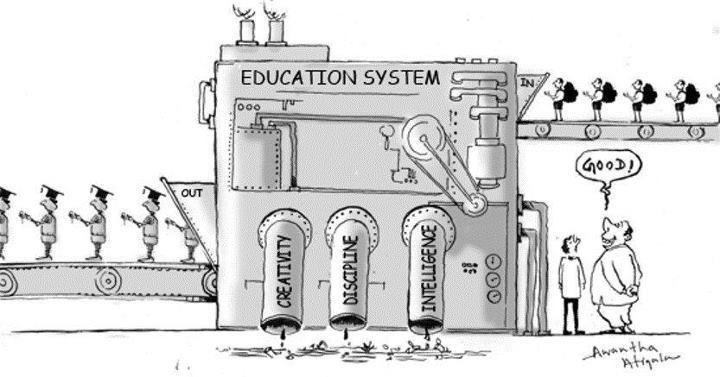A Case Against Personalized Learning
In week 8 of the Critical Issues in Digital Education course, we discussed one of the most commonly cited advantages of using AI in education – its potential to personalize learning. We are then invited to reflect on why, given its potential, why would anyone argue we have to be careful about personalized learning. In this week’s blog, I will aim to answer this question based on my personal experience teaching English language acquisition at the middle school level in Estonia as well as some insights I gained from this week’s assigned readings. I will specifically argue against two aspects of personalization – defying the “one size fits all” curriculum and allowing students to “learn at their own pace” – with the view that both of these aspects have the potential to reinforce existing inequalities and further undermine democracies around the world.

Image credit: “Factory model schools” by Awantha Artigala
Let’s start with the all-too-familiar claim that modern education follows the “one size fits all” curriculum model and that personalization with the help of AI will help educational institutions move away from this model. For this, I believe Pelletier’s (2024) invitation to think back to Biesta’s three functions of education is particularly useful. If we consider subjectification an important function of education and raising responsible democratic citizens as part of the agenda in the curriculum, where does this place the argument that the “one size fits all” curriculum model is dysfunctional? Pelletier (2024) brings up a very valid claim that faith in public education systems was not based on industrial-era values but rather on values of democracy and the commitment to creating a democratic society. After all, there is not a single educator I’ve met so far who believed that their practice is based on the “one size fits all” model and did not do some level of personalization of their classes to their students. While teaching in Estonia for 2,5 years, I experienced a lot of freedom in adjusting the state curriculum to the needs and interests of my students all while following state guidelines for quality review of digital teaching materials. When it comes to personalizing the national curriculum, I would be extra careful before trusting privately developed generic algorithms over teachers with a good understanding of the local context and their students to do the job.

Credit: https://www.talentlms.com/blog/tips-create-self-paced-elearning/
For the second argument for using AI to personalize the pace of learning and let students “learn at their own pace”, I find Williamson’s (2020) article particularly useful albeit scary in terms of considering how this argument might be moving us back to the 19th-century rhetoric of Francis Galton, the founder of eugenics, whose experiments were based on his ideas of man as a “conscious machine” and a “slave of heredity and environment”. The idea that education should be adjusted to some pre-determined abilities or features carries a lot of ethical and social implications. Pelletier (2024) rightfully argues that claiming that we need personalization to enable “learning at your own pace” not only creates a certain view of knowledge and education as something that has a clear beginning and end, and the pace is something that can be determined in relation to closing the gap between the two; it is also just a polite way of saying that some students naturally learn “slower” and hence cannot keep up with other, “faster” learning, students. This raises a lot of concerns about how using AI to personalize education’s “pace based on this assumption might just be using algorithms to legitimize the view of education as meritocracy (Young, 1994) and keep some students behind based on purpose.
All in all, while striving to honor the diversity and individuality of students is an important goal, I believe the obsession with the personalization of the curriculum and educational process poses an existential threat to democracies around the world as well as has the potential to bring back some of the eugenics rhetorics of people being “slaves to their heredity and environment”. While we should be open to the potential that new technologies have for supporting students as individuals, we should not blindly accept that technology-enablement personalization of the educational process is inherently a good thing.
References
- Pelletier, C. Against Personalised Learning. Int J Artif Intell Educ 34, 111–115 (2024). https://doi.org/10.1007/s40593-023-00348-z
- Williamson, B. 2020, ‘Bringing up the bio-datafied child: Scientific and ethical controversies over computational biology in education’, Ethics and Education. https://doi.org/10.1080/17449642.2020.1822631
- Young, M. (1994). The rise of the meritocracy. Transaction Publishers.




Hi there, Marta!
Thanks for this blog post! It is well written. You are improving your academic writing; this blog is proof of this.
I will begin by stating that you crafted your argument clearly in your introductory paragraph. You state, “I will specifically argue against two aspects of personalization – defying the “one size fits all” curriculum and allowing students to “learn at their own pace” – with the view that both of these aspects have the potential to reinforce existing inequalities and further undermine democracies around the world”. And then, you proceed to develop this argument. Good job.
You also provide a clear conclusion to your argument. In this sense, your blog post has a clear structure. This is the base of all writing.
Now, let’s explore the development of your arguments. In your first argument you return to Biesta’s argument. That’s good, as you are building from your prior knowledge. You also draw on your experience and your context. That’s great.
To improve this segement of your blog, you could develop two paragraphs to develop two main ideas I find in the paragraph. First, that the “one-size-fits-all” curriculum is a myth. A second paragraph would begin with this sentence: “If we consider subjectification an important function of education and raising responsible democratic citizens as part of the agenda in the curriculum, where does this place the argument that the “one size fits all” curriculum model is dysfunctional?”. I’m interested in knowing more about the relationship between subjectification, AI, and personalization.
Your second argument has several flanks, and I think it can improve by focusing in one or two of them. You begin discussing the relationship between eugenics and personalization. I think that this relationship needs more development to become clear to the reader. You can consider dedicating a couple of paragraphs to develop this idea. You also mention that “education should be adjusted to some pre-determined abilities or features carries a lot of ethical and social implications”. What are those? Finally you state that “sing AI to personalize education’s “pace based on this assumption might just be using algorithms to legitimize the view of education as meritocracy (Young, 1994) and keep some students behind based on purpose”. What do you mean by “keeping some students behind on purpose”? I think that that idea needs ore clarity and development on its own.
To round up, keep up the good effort: structure, hyperlinks, and images. And in the next post try to delve deeper into the nuances of your arguments.